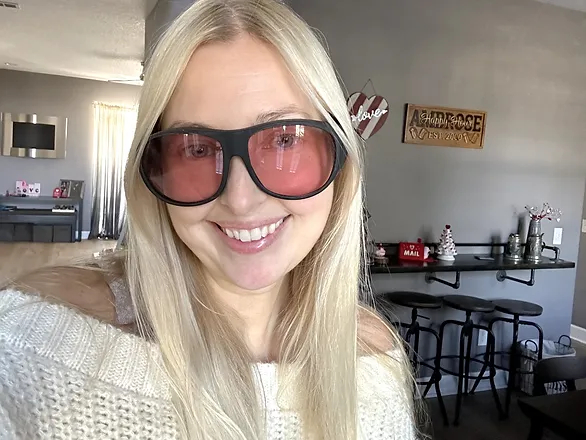
I’ve lived with Visual Snow Syndrome (VSS) for 18 years. When I started my mom blog, I hesitated to write about VSS. It’s not a common condition and I wasn’t sure it would resonate with many moms. But, it’s a significant part of my life, and I believe in sharing our whole selves. So, from time to time, I talk about my experiences with VSS – the struggles and the solutions that help me cope. I hope to connect with others in the VSS community, to share that you’re not alone in this journey.
Visual Snow Syndrome affects how a person sees the world. For me, it’s like viewing life through a static-filled TV screen. It can be accompanied by light sensitivity and halo effects around lights. It’s more than just a vision issue (it’s actually neurological); it’s a daily challenge that I, and many others, navigate.
Why Regular Glasses Might Not Cut It for VSS
Standard glasses often fall short for those with VSS. Our needs are unique, requiring specialized lenses to mitigate symptoms like glare and light sensitivity.
Exploring Glasses Options for Visual Snow Syndrome
- Tinted Lenses: These glasses come with a slight color tint, which helps reduce glare and the intensity of bright lights. For VSS, yellow or amber tints can be particularly helpful.
- Polarized Lenses: Ideal for outdoor use, these lenses cut down on glare from reflective surfaces, a common irritant for people with VSS.
- FL-41 Tinted Glasses: Developed for light sensitivity, these rose-tinted glasses are especially effective against fluorescent lighting, which is often problematic for those with VSS.
- Blue Light Blocking Glasses: Prolonged screen use can be taxing. Blue light glasses help reduce eye strain, a boon for VSS sufferers like myself.
- Sunglasses for VSS: Sunglasses with UV protection are crucial for those with VSS, especially for bright, sunny days. Look for options that offer full UV protection and consider polarized lenses to reduce glare. Wearing sunglasses outdoors can significantly decrease discomfort from bright light.
Tips for Choosing the Right Glasses
- Consult with an Eye Specialist: Before you buy any glasses, it’s a good idea to talk to an eye doctor who understands VSS. They can guide you to the right type of glasses based on your specific symptoms.
- Consider Your Daily Activities: Think about where you struggle the most with your vision. If you’re often outdoors, polarized lenses might be best. If you work in an office with lots of fluorescent lights, FL-41 tinted glasses could be the way to go.
- Test Different Tints and Filters: Sometimes, it’s a trial-and-error process. Try different tints and filters to see which one brings the most relief.
- Consider Owning Multiple Pairs: Sometimes one pair of glasses isn’t enough. Different situations might require different types of glasses. Having a couple of options can be really helpful.
Adapting Visual Snow Syndrome Glasses Options for Prescription Wearers
For those of us with Visual Snow Syndrome (VSS) who also wear prescription glasses (this is me!), finding the right vision solution can feel like a double challenge. But don’t worry, there are practical ways to adapt the glasses options I mentioned earlier to work with your prescription needs.
Prescription with Special Tints and Filters
- Tinted Prescription Lenses: Many opticians can add tints like yellow, amber, or the FL-41 tint directly to your prescription lenses. This means you can have the benefits of these specialized tints while correcting your vision at the same time.
- Polarized Prescription Lenses: If you spend a lot of time outdoors, consider getting your prescription lenses polarized. This helps reduce glare from surfaces like water or roads, making outdoor activities more comfortable.
- Blue Light Blocking Prescription Lenses: For those of us who spend a lot of time in front of screens, blue light blocking technology can be incorporated into prescription lenses, providing relief from screen glare and reducing eye strain.
Fitover Glasses
If you already have a pair of prescription glasses that you love, another option is to use fitover glasses. These are specially designed to be worn over your existing glasses. They come in various tints and filters, like FL-41, polarized, or blue light blocking. This is a flexible solution, allowing you to switch between different types of fitover glasses depending on your activity or the time of day. If you see the photo at the top of this post, my FL-41 glasses are fitover glasses.
Clip-Ons and Attachments
Another convenient option is clip-on lenses that attach to your existing prescription glasses. These can be polarized, tinted, or blue light blocking. They’re easy to put on and take off, making them a practical choice for when you’re moving between different lighting environments.
Transition Lenses
For ease and convenience, consider transition lenses in your prescription glasses. They darken in response to sunlight, offering UV protection and reducing glare when you’re outside. While they don’t offer the specific tints like FL-41, they can be a good all-around choice for varying light conditions.
Living with VSS and needing prescription glasses means looking for vision solutions that address both needs. Whether it’s getting specialized tints in your prescription lenses, using fitover glasses, or trying out clip-ons, there are several ways to make your eyewear work for you. It’s all about finding what combination provides you the most comfort and clarity in your daily life.
Living with VSS is a journey with its ups and downs. Finding the right glasses can significantly improve your quality of life. By sharing my story and experiences, I hope to offer support and guidance to others facing similar challenges. Each step you take is a move towards better managing your symptoms and enjoying a clearer, more comfortable view of the world.



